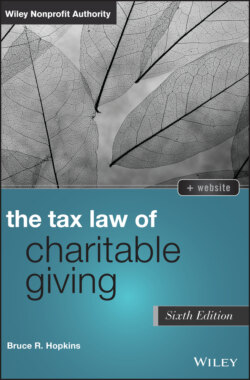Читать книгу The Tax Law of Charitable Giving - Bruce Hopkins R., Bruce R. Hopkins, David Middlebrook - Страница 35
(k) Requirement of Completion
ОглавлениеExplicit and implicit in the foregoing discussion is the concept that, to constitute a gift, the transaction must be completed. Thus, to make a charitable gift, the donor must part with all right, title, and interest in the donated property.222
Two situations nicely illustrate the point. A court held that a bargain sale223 of real estate to a charity, in a transaction that used a contract for deed, gave rise to a charitable deduction in the year the contract was entered into, because the charity essentially received equitable title to the property.224 In 1994, a married couple signed a contract for sale of real property to a church. The purchase price was to be paid in installments, beginning January 1, 1995. Basically, a contract for deed is an arrangement under which, once a down payment is made, the buyer becomes entitled to immediate possession of the property. Legal title, however, remains in the seller until the purchase price is paid in full. In this case, the charity also agreed to insure the property, keep it in good repair and condition, and pay property taxes. The charity was prohibited from assigning, selling, pledging, or mortgaging the property without the donors' consent. Legal title was conveyed to the charity at the end of 1997.
The IRS did not contest the value of the property used to calculate the charitable deduction.225 The charity was a qualified charitable donee;226 the IRS conceded that the donors had the requisite charitable intent.227 The sole issue before the court was whether the donors' entry into the contract for deed effected a completed gift of the property during 1994. Framing the issue this way, the court had to determine (1) whether the interest conveyed was sufficient to constitute a completed gift, and (2) when the sale and gift were completed. The IRS took the position that this type of contract did not give rise to a completed gift at the time it was entered into.
State law controls the determination of the nature of the property interest conveyed by one party to another. This law usually is found in pronouncements by the state's highest court. The court in this case, following this analysis, concluded that the purchaser under a contract for deed becomes the equitable owner of the property.
The question of whether a sale of property is complete for tax purposes is one of fact, which is resolved by an examination of all the facts and circumstances. Essentially, the matter comes down to a consideration of when the “benefits and burdens” of ownership shifted. In the case of real property, a sale generally is considered to have occurred at the earlier of the transfer of legal title or the practical assumption of these benefits and burdens.
The court wrote: “A closed transaction for Federal tax purposes results from a contract of sale which is absolute and unconditional on the part of the seller to deliver to the buyer a deed upon payment of the consideration and by which the purchaser secures immediate possession and exercises all the rights of ownership.”228 Having written that, the court noted that there can be a delay in the delivery of the deed and that payment of the purchase price may be deferred by installment payments. Ownership of property, observed the court, amounts to a “bundle of rights with respect to the property.”229
In the case, the court sided with the donors. It concluded that the “bundle of rights that the [charity] received is essentially the same bundle of rights that would have been received had the church obtained legal title to the property and granted a mortgage back” to the donors.230 The gift was determined to have been made in 1994, not 1997.
The other situation concerned contributions to a donor-advised fund maintained by a charitable organization on its website.231 Donors are informed that contributions to the donor-advised fund are unconditional and irrevocable. They must affirmatively acknowledge that fact by clicking on a specific field. They are told that ultimate discretion over transfers out of the donor-advised fund lies with the organization. Recommendations from a donor may be followed only after the organization conducts the appropriate due diligence. The organization's policy is to follow the donor's advice, as long as the recommended recipient is a public charity and is prepared to accept the gift. Distributions are not to be made to individuals, private foundations, or other donor-advised funds.
This organization qualifies as a publicly supported charity.232 The question in this instance was whether transfers to the donor-advised fund constitute the requisite support as contributions. The IRS, in answering this question, looked to the regulations concerning the termination of private foundation status. There it is stated that, to effectuate a transfer of “all its right, title, and interest in and to all of its net assets,” a transferor foundation may not impose any material restriction or condition that prevents the transferee organization from freely and effectively employing the transferred assets, or income from them, in furtherance of exempt purposes.233
The IRS wrote that the core issue is whether an organization exercises “dominion and control” over the asset so as to be considered its owner. Though the IRS did not say so, the issue was whether donors' ability to make these recommendations, and the organization's policy of generally following these recommendations, amounted to a material restriction or condition. Without discussion, the IRS ruled that contributions made to this organization, destined for the donor-advised fund, constitute support from the public.234
